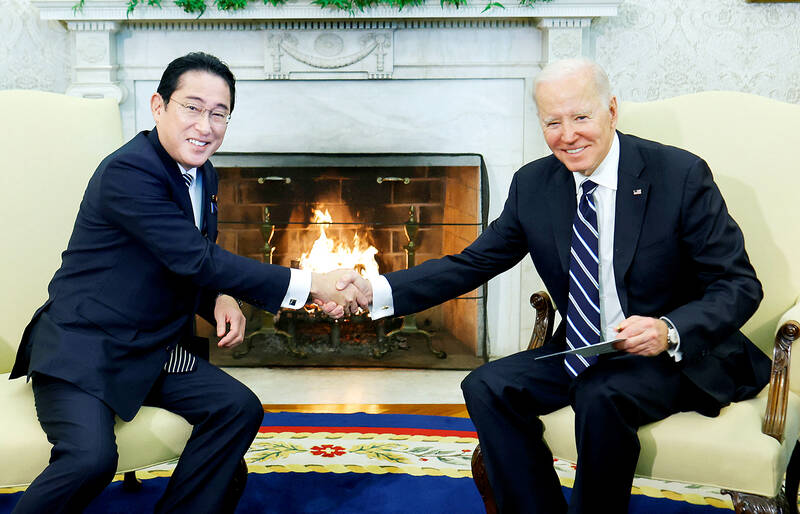The US and Japan on Friday said that maintaining peace and stability across the Taiwan Strait is essential to security in the Indo-Pacific region.
The joint statement was released by the White House after a meeting in Washington between US President Joe Biden and Japanese Prime Minister Fumio Kishida to discuss their countries’ alliance and security issues, including possible conflicts in the Taiwan Strait.
“We emphasize that our basic positions on Taiwan remain unchanged, and reiterate the importance of maintaining peace and stability across the Taiwan Strait as an indispensable element of security and prosperity in the international community,” the statement said.

Photo: Reuters
“We encourage the peaceful resolution of cross-strait issues,” it added.
Biden and Kishida said that their alliance remains the cornerstone of welfare in the Indo-Pacific region.
However, they also recognize that the challenges their countries face transcend geography, particularly as a result of the war in Ukraine.
“United across the Atlantic and Pacific oceans, we have stood together in firm opposition to Russia’s unjust and brutal war of aggression against Ukraine, and we will continue to impose sanctions on Russia, and provide unwavering support for Ukraine,” the statement said.
The leaders also exchanged their views about the Indo-Pacific Economic Framework, a US-led multilateral partnership involving 13 other countries, including Japan, that has been touted as a bulwark against China’s growing economic influence in the region, it said.
“As inclusive democracies, we will ensure economic prosperity is broadly shared across our societies and recommit to achieving gender equity and equality as well as women’s empowerment,” the statement said.
Meanwhile, Biden and Kishida also urged Beijing to do its part to report epidemiological and viral genomic sequence data regarding the spread of COVID-19 across China to enable global public health officials to identify possible new variants and to reduce their spread.
In Taipei, Ministry of Foreign Affairs deputy spokesperson Hsiao Kuang-wei (蕭光偉) yesterday said: “Maintaining peace across the Taiwan Strait has clearly become the consensus of the international community, in the face of China’s expansionism, which challenges the global democratic order, and has aroused the concerns of liberal and democratic countries worldwide.”
Taiwan is bolstering its self-defense capabilities and resisting threats to its sovereignty, Hsiao said.
“We will also deepen cooperation with the US, Japan and other like-minded countries to safeguard the security of the Taiwan Strait, jointly promote development in the Indo-Pacific region, and ensure peace, stability and economic prosperity,” he said.

Conflict with Taiwan could leave China with “massive economic disruption, catastrophic military losses, significant social unrest, and devastating sanctions,” a US think tank said in a report released on Monday. The German Marshall Fund released a report titled If China Attacks Taiwan: The Consequences for China of “Minor Conflict” and “Major War” Scenarios. The report details the “massive” economic, military, social and international costs to China in the event of a minor conflict or major war with Taiwan, estimating that the Chinese People’s Liberation Army (PLA) could sustain losses of more than half of its active-duty ground forces, including 100,000 troops. Understanding Chinese

The Ministry of Foreign Affairs (MOFA) yesterday said it is closely monitoring developments in Venezuela, and would continue to cooperate with democratic allies and work together for regional and global security, stability, and prosperity. The remarks came after the US on Saturday launched a series of airstrikes in Venezuela and kidnapped Venezuelan President Nicolas Maduro, who was later flown to New York along with his wife. The pair face US charges related to drug trafficking and alleged cooperation with gangs designated as terrorist organizations. Maduro has denied the allegations. The ministry said that it is closely monitoring the political and economic situation

UNRELENTING: China attempted cyberattacks on Taiwan’s critical infrastructure 2.63 million times per day last year, up from 1.23 million in 2023, the NSB said China’s cyberarmy has long engaged in cyberattacks against Taiwan’s critical infrastructure, employing diverse and evolving tactics, the National Security Bureau (NSB) said yesterday, adding that cyberattacks on critical energy infrastructure last year increased 10-fold compared with the previous year. The NSB yesterday released a report titled Analysis on China’s Cyber Threats to Taiwan’s Critical Infrastructure in 2025, outlining the number of cyberattacks, major tactics and hacker groups. Taiwan’s national intelligence community identified a large number of cybersecurity incidents last year, the bureau said in a statement. China’s cyberarmy last year launched an average of 2.63 million intrusion attempts per day targeting Taiwan’s critical

‘SLICING METHOD’: In the event of a blockade, the China Coast Guard would intercept Taiwanese ships while its navy would seek to deter foreign intervention China’s military drills around Taiwan this week signaled potential strategies to cut the nation off from energy supplies and foreign military assistance, a US think tank report said. The Chinese People’s Liberation Army (PLA) conducted what it called “Justice Mission 2025” exercises from Monday to Tuesday in five maritime zones and airspace around Taiwan, calling them a warning to “Taiwanese independence” forces. In a report released on Wednesday, the Institute for the Study of War said the exercises effectively simulated blocking shipping routes to major port cities, including Kaohsiung, Keelung and Hualien. Taiwan would be highly vulnerable under such a blockade, because it